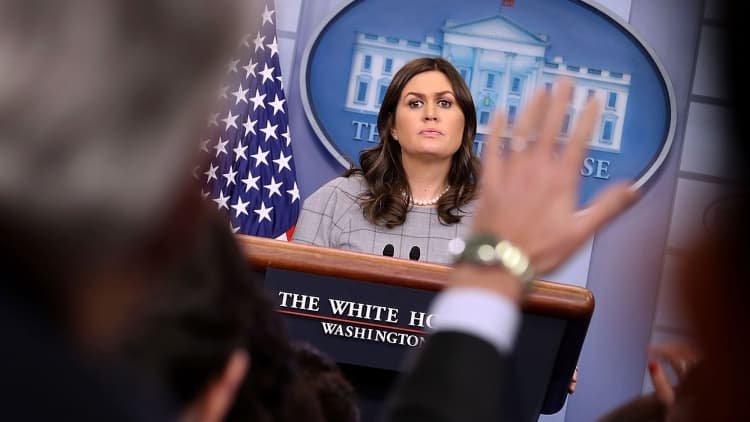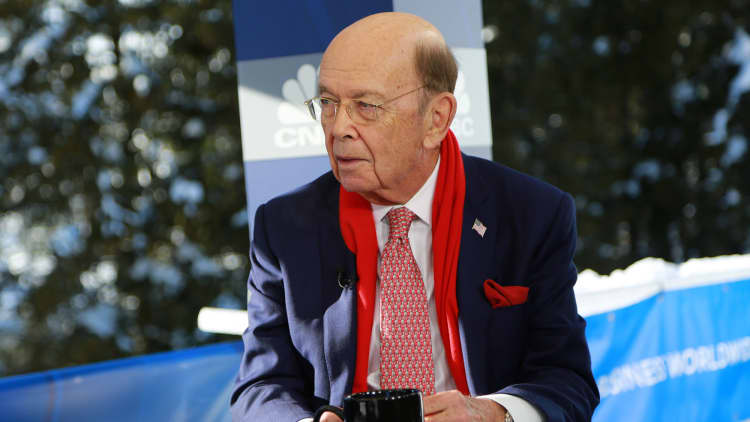
Treasury Secretary Steven Mnuchin will have a chance to clarify Thursday whether he really meant to indicate a shift away from the long-held U.S. policy that a strong dollar is in America's best interests.
The dollar index slumped nearly 1 percent Wednesday after Mnuchin was quoted as saying that the weak dollar is good for U.S. trade, in a briefing with reporters at the World Economic Forum in Davos, Switzerland. That comment shook the foreign exchange market and sent the dollar skidding to its lowest level in three years.
Some strategists said Mnuchin may have been quoted out of context since he also spoke in favor of a strong dollar, reflecting a solid economy. But the market latched onto the comment about dollar weakness, particularly since President Donald Trump has previously spoken in favor of a weaker greenback.
Mnuchin appears on a panel at 11 a.m. CET, or 5 a.m. ET, at the conference in Davos, side by side with IMF Managing Director Christine Lagarde and U.K. Chancellor of the Exchequer Philip Hammond, among others. CNBC Europe's Geoff Cutmore hosts the panel.
Separately, European Central Bank President Mario Draghi speaks after an ECB meeting at 8:30 a.m. ET in Frankfurt, and he most certainly will be asked about the euro's stunning rise against the dollar. The market has also been anticipating comments from Draghi on when the ECB could step back from more of its policy easing.
"It's premature to suggest the [Mnuchin] dollar comments were meant to signal a change from a strong U.S. dollar policy," said Ben Randol, G-10 foreign-exchange strategist at Bank of America Merrill Lynch.
"We're objectively looking at the situation, and we're waiting to see what he says. If it is a shift in dollar policy, that would be very significant," said Randol.
Randol said Mnuchin seems to have been responding to questions about the 10 percent decline in the dollar since the start of the Trump administration. "I think there's a chance he wanted to spin the decline as positive," he said, adding Mnuchin also talked about a stronger dollar as a positive.
"I imagine he'll be asked point blank: 'Could you please clarify your statement, and are you advocating a weak dollar policy? Is this a shift in the U.S. position on a strong dollar?' That's a really important answer to listen for," Randol said.
Randol said Draghi will be circumspect when it comes to commenting on the euro, and instead of saying whether the single currency is too strong, he will note that it will be reflected in the outlook. "He could say that we monitor exchange-rate developments, and we don't target any one level and changes in the exchange rate will be reflected in our projections," said Randol.
The market's sensitivity to Mnuchin's comments have been heightened by U.S. actions this week on trade, and the fact that the latest round of talks in the renegotiation of NAFTA are currently underway in Canada. New U.S. tariffs were placed on washing machines and solar panels Tuesday. At the same time, U.S. officials, Commerce Secretary Wilbur Ross among them, have been in Davos promoting Trump's "America first" policies.
The stock market was mixed Wednesday, but the Dow closed at a record high. During the afternoon session, the Dow retreated and stock traders then pointed to the dollar comments and unease about U.S. trade policy, seen as protectionism by some.
"Tariffs, the currency, the trade negotiations with NAFTA and other trade deals. It's three fronts in the trade war of trying to put America first," said Jeff Kleintop, chief global investment strategist at Charles Schwab. He said trade protectionism is the biggest worry for the record high stock market, and if the Trump administration takes some broad action, it could lead to the first correction in a long while.
Brown Brothers Harriman chief foreign exchange strategist Marc Chandler noted a weaker currency may bolster trade, but it also risks making U.S. assets less appealing, including Treasury debt.
"Mnuchin has previously acknowledged that there will be a substantial increase in Treasury issuance this year. Last year's net sales were around $550 billion. This year, net issuance is likely to be double that if not a bit more," he wrote in a note. The increase in debt issuance is expected to pay in part for tax cuts, recently put into law, and growing entitlement expenditures.
The bond and currency markets have been somewhat nervous about the expansion of U.S. debt issuance. Recently, the biggest holders of U.S. debt, China and Japan, were reported to be net sellers in November, according to government data.
There is also concern that central banks are finding other currencies attractive for reserves. While strategists say the U.S. is too important to lose its status as the reserve currency, there does seem to be a shift from U.S. assets as U.S. debt balloons and the dollar weakens.
The strong U.S. dollar policy began in the Clinton administration with Treasury Secretary Robert Rubin. A number of analysts noted Wednesday that a tipping point before the 1987 stock market crash came with then-Treasury Secretary James Baker's dispute with Germany over dollar weakness.
"Through the mid-1990s, the U.S. and other countries habitually wanted [to] directly influence the foreign exchange market. Countries sought competitive advantage. However, beginning with Rubin's "strong dollar policy," best practices evolved toward letting markets determine exchange rates. This is now the official position of the G-7 and G-20. In effect, the foreign exchange market was de-weaponized," wrote Chandler in a note.
WATCH: Wilbur Ross says US not abandoning strong dollar policy



